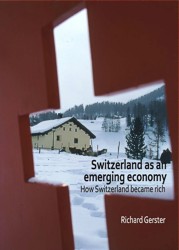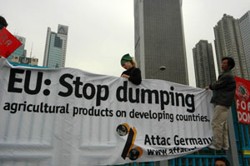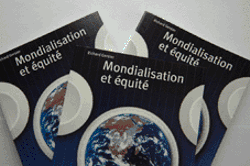RESULTS: GLOBALISATION |
||||
 |
||||
|
Switzerland as an Emerging Economy. How Switzerland became rich No raw materials, a low level of agricultural production, complex traffic routes, political fragmentation - how come Switzerland was at the cutting edge of industrialisation as early as the 18th and 19th century and a tough competitor for a great power like England? Why is it today among the richest countries world-wide? What relevance does Switzerland's historical development have today? To what extent is it relevant for the future of Africa, Asia and Latin America? These are the guiding questions of this publication as it presents cornerstones of Swiss economic history in an easily readable and illustrated manner. By no means is this publication a request for other countries to copy Switzerland's path to prosperity. There are no one-size-fits-all approaches, least of all in today's completely changed economic world order. At the same time learning from experience is not forbidden. In this publication it is not the Swiss but personalities from Africa, Asia and Central America who draw conclusions from the described historical developments. It can be downloaded in German and English. |
Output: 34 pp Authors: Richard Gerster Download PDF: Switzerland as an Emerging Economy (english) Schwellenland Schweiz (german)
|
|||
 |
||||
|
Switzerland, part of the global village
The world influences Switzerland, and vice versa. A brochure just published by the Swiss Agency for Development and Cooperation (SDC) highlights Switzerland's strengths and weaknesses in the context of North-South relations. 20 attractive graphs illustrate facts and comparisons in the fields of politics, economics, society and cooperation. The SDC commissioned Richard Gerster to prepare the brochure, which is available in German, French and Italian. The publication can be downloaded on the right or at the SDC’s website, where hard copies can be ordered also, free of charge (again in German, French, Italian, but not in English). |
Output: 50 pp. Author: Richard Gerster Download PDFs: CH & Welt (German) CH & monde (French) CH & mondo (Italian)
|
|||
 |
||||
|
ECDPM External Evaluation 2001–2005
The evaluation itself became an innovative piece of institutional analysis of a centre moving at the ridge of development cooperation between North and South, and particularly with regards relations between the European Union (EU) and the African, Caribbean and the Pacific Group of States (ACP). The final report summarises the team’s findings in a nutshell: "The Centre’s primary added value is around its process orientated and independent broker approach, its unique focus on EU–ACP, and its positioning amongst the relationship between, research, policy and practice." |
Output: 72 pp. Authors: Konrad Matter (Team leader), Raphael E. Mwai, Edward Sefuke, Andrew Sherriff Download PDF: ECDPM Evaluation
|
|||
 |
||||
|
Mondialisation et équité («Globalisation and Equity»)
|
Output: 208 pp. Author: Richard Gerster Editions Loisir et Pédagogie, CH-1052 Le Mont-sur Lausanne, CHF 39, à commander http://www.editionslep.ch
|
|||
 |
||||
|
Globalisation and Equity ("Globalisierung und Gerechtigkeit")
More than 70 graphic multi-coloured presentations mirror inequalities of wealth and poverty, power, politics, trade, finance, environment across the globe. A dozen development success stories are presented. The first edition of this publication, often used at high schools, won two major educational awards:
Selected graphs on core issues in North-South relations are accessible at this homepage under information/graphs. |
Output: 204 pp., hardback publication by hep-Verlag. Berne 2005 Author: Richard Gerster Order for CHF 39 at hep - Verlag
|
|||
 |
||||
|
Global Public Goods: A Development Perspective (German Only)
GPGs are produced in the self interest of the rich countries – their wealth depends as much on the GPGs as does the development of the Southern hemisphere. These different objectives and interests beyond poverty reduction necessitate to find new funding sources for GPGs. What are the main development concerns in the GPG debate? The paper, written on behalf of the Swiss Agency for Development and Cooperation, tries to answer that question. In view of the achieving the Millennium Development Goals (MDGs) in 2015, the relationship between development cooperation and GPGs has to be clarified. |
Output: 21 pp., unpublished research for the Swiss Agency for Development and Cooperation Authors: Richard Gerster and Niklaus Eggenberger-Argote Download PDF: GPGs & Development
|
|||
 |
||||
|
Globalisation and Africa. What Perspectives for Development Co-operation? A Background Paper
(1) African speakers would question Swiss perspectives on globalisation, challenge Swiss policies, including bilateral activities in Africa and positions taken in multilateral institutions, and propose alternative policy options. (2) Participants involved in development cooperation with African partners would increase their competence to link effectively their strategic objectives and daily work on local issues to the global economic environment. (3) Key areas of consensus as well as of controversy would be identified from a development cooperation perspective. In this context, this background paper aimed to provide an overall framework for the workshop; to offer an orientation for the three working groups in all three sessions; to stimulate debate and learning. |
Output: 13 pp Authors: This background paper has been a joint effort by an SDC preparatory group (Peter Beez, Giorgio Bianchi, François Binder, Jean-Maurice Délèze, Martin Fässler) and an external consultant (Richard Gerster). Download PDF: Globalisation and Africa Background Paper
|
|||
 |
||||
|
Globalisation and Africa. What Perspectives for Development Co-operation? Summary Final Report
It provides a summary of the key messages in the following areas: Globalisation – a political project; state sovereignty revisited; new challenges for the state; development dilemmas; biased accountability; trade barriers and liberalisation; relevance of context; respect for livelihoods; regional solutions; inclusive policy making; shaping alliances. An electronic version of the complete report on this event,
including the presentations, can be obtained from |
Output: 17 pp. Authors: Martin Fässler (SDC), Richard Gerster, Sonja Zimmermann Download PDF: Globalisation and Africa Summary
|
|||
 |
||||
|
Global Public Goods: A Swiss Perspective (German Only)
It provides a summary of the key messages in the following areas: Globalisation – a political project; state sovereignty revisited; new challenges for the state; development dilemmas; biased accountability; trade barriers and liberalisation; relevance of context; respect for livelihoods; regional solutions; inclusive policy making; shaping alliances. An electronic version of the complete report on this event,
including the presentations, can be obtained from |
Output: 15 pp., unpublished presentation for a seminar of the Swiss Agency for Development and Cooperation on 21 January 2002 Author: Richard Gerster Download PDF: GPG SDC
|
|||
 |
||||
Gerster Consulting (www.gersterconsulting.ch)
Göldistrasse 1, CH-8805 Richterswil (Switzerland)
Phone +41.(0)44.784.83.08 Fax +41.(0)44.784.83.17










